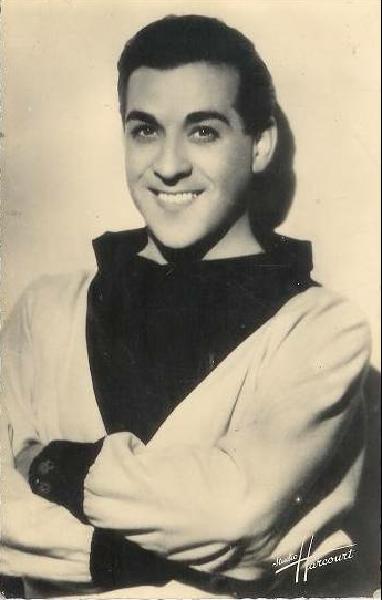A native Basque from the Spanish-Basque town of Irun, immediately on the French border, his real name was Luis González (Mariano was his
second baptismal name). He moved to Bordeaux with his parents when the Spanish
Civil War broke out in 1936. He studied Fine Arts while singing in a cabaret every night to earn a living. In 1939, he decided that his vocal
talent was superior to his artistic, and switched to the Bordeaux conservatory.
Several of his friends and acquaintances are credited with having instigated Mariano's career take-off in Paris (where he also furthered his
vocal studies); whoever it really was, she or he
did it right. Newcomer Mariano got the lead role of Ernesto in a 1943/44 Don Pasquale production that had a long run, first at the Palais
de Chaillot and then at the Théâtre des Variétés, with a partner as prominent as Vina Bovy. It was a tremendous
success, and excerpts were immediately immortalized on record.
Mariano sang Ernesto also in Marseille, and a bit more opera in smaller French theaters (Bohème, Tosca and Madama
Butterfly) – and then
largely abandoned his classical ambitions since he was already successful in film (he made 23 of them, all in all), and soon in operetta. Not in
classical operetta, though: with the French composer Francis Lopez (two years his junior), he formed a team nothing less successful than
Tauber–Lehár, and together, they created the very last successful operettas – hugely successful, at least in France and
Belgium, where Mariano is still a household name and a legend. La belle de Cadix came first (December 1945, Casino Montparnasse),
Andalousie followed in 1947, Le chanteur de Mexico (perhaps the most famous of the Lopez–Mariano works;
"Mexico, Mexi-iiiiiiiico" should be familiar to most everybody, far beyond France), La toison d'or, Le secret de Marco Polo
Visa pour l'amour, Le prince de Madrid and La caravelle d'or secured both men's success until 1969, although their style
gradually went out of fashion in the 1960s. Other composers, too, wrote works for Mariano (notably Henri Bourtayre and Jacques-Henri Rys, whose
joint effort Chevalier du ciel was premiered in 1955); and Lopez, the other way round, wrote music also for Mariano's films (Violettes
impériales being the most significant of them).
Mariano sang his operettas on stage all over France and Belgium, he toured Canada, the USA, South America, North Africa and Spain, and he made
countless recordings that sold like hot cakes.
But even when already the greatest operetta star of his generation, Mariano obviously made occasional appearances in opera. He is said to have
sung in Tosca in Belgium, but it's dubious where: maybe in Charleroi, where he was a regular guest in operetta, or in Gent, where his
former Don Pasquale partner, Vina Bovy, was the opera director after ending her career, and where he, due to that old relationship, is
said to have sung regularly, as well. I'm almost certain that in Charleroi, he also performed in Cavalleria rusticana – if
anyone happens to have any more precise information, I'd be very grateful to get it!!
Reference 1, reference 2, reference 3, reference 4, reference
5
